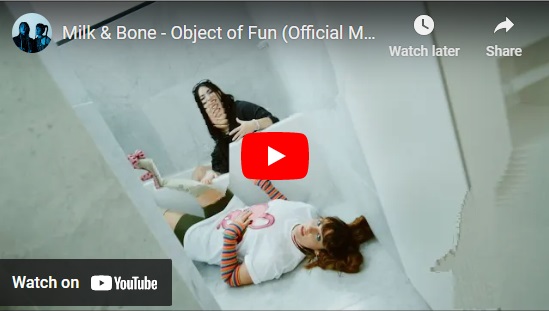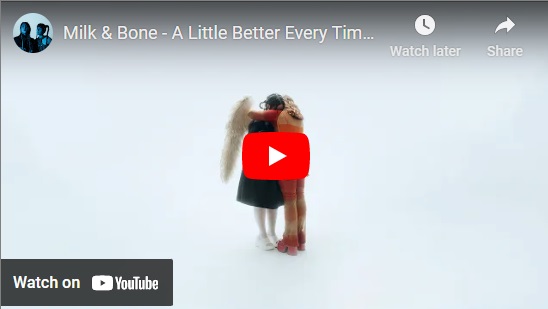At the end of the day, Milk & Bone didn’t re-invent themselves on their third album, Chrysalism; their songs are once again bathed in their signature, latent melancholy. Formally, however, the evolution is spectacular, so much so that the album’s opening song, “Bigger Love,” is just a hair short of making us – as well as the duo themselves – want to dance: “What’s cool about it is that in a live context, it forces us to be vulnerable in a different way, which is to say, by dancing,” explains Laurence Lafond-Beaulne, one-half of the duo. “There’s something very intimate in the movement of a body, it’s just as personal as the way you sing, which is something we’re much more accustomed to. We’re increasingly exploring that form of liberty, and it’s beneficial for us.”
“We did think about the live shows while we were creating the album,” Lafond-Beaulne continues. “We know what songs our audiences enjoy the most, and what songs make us the happiest when we play them. One way or another, it probably had an influence on the album’s direction,” which refers to its robust rhythms, the breakbeats that have replaced the more uniform house beats so ever-present in modern pop. “We’re working on our live show right now, and there’ll be more movement and risk-taking, a form of abandon that stems from freeing the body. We want to explore that more.”
Co-produced by their Californian colleague Micah Jasper, Chrysalism was written and recorded during the pandemic. At the outset of it all, Camille Poliquin and Laurence Lafond-Beaulne clearly needed to shake their tailfeathers. At least a little, says Lafond-Beaulne: “We write from our sadness and our pain. I don’t think we could write happy, positive songs while preserving the sound of the first Milk & Bone album [Little Mourning, 2015]. The production is more on the ball, but our writing still stems from the same place,” she says about the reflections – both existential and relational – that permeate the duo’s lyrics.
As the musicians confirm, the form changes, but the creative process remains the same. Says Camille Poliquin, “Like everyone else, the pandemic gave us a break, and we had more time to write each on our own, but this album was made exactly like its two predecessors. We plan for writing retreats together, and that’s when we look at what the other has written, and where our common ground is. We don’t have specific jobs within that process; we write the lyrics and the melodies as a duo. We complement each other. Our workflow is well-oiled after two albums, and we have a wonderful collaboration.”
Lafond-Beaulne adds, “One thing is clear: even if the idea for a song belongs to the personal history of one of us, we always work on it together. That’s why, after collaborating for the past decade, we understand each other. Sometimes we’ll talk openly [about a song’s topic], but often, when one of us starts working on a song, the other one immediately knows what she wants to say. Camille is able to write from my perspective and vice versa. Ultimately, we all experience human trials and wounds differently, but we can also identify with those situations.”
Thus, the pandemic – as well as the musicians’ passage into their thirties – fed the stories on Chrysalism, a title that refers to the safety we feel when we shelter from a storm, a virus, or more metaphorically, from one of these threats that our society always weighs on “the other”… “One thing we did [during the creation of the album] is to have a different perspective on our identity as women, with the hindsight of what we lived during the last decade,” says Poliquin. “I had a lot to say on that topic!”
They take a stand on their very nature, in songs such as “Object of Fun”: “We talk about the male gaze,” says Poliquin. “What I mean is, how we often realize, later, and too late, that we allowed ourselves to be belittled and accommodating. But it’s also a broader reflection on what’s expected of women in our society, and how we deal with that.”
“A lot more is expected of women than of men, and the male gaze is also a bit about that,” says Lafond-Beaulne Laurence, before explaining the meaning of the lyrics of “Green Dot.” “It’s about that painful moment at the end of a relationship where it becomes difficult to let go,” obsessed by a contact that’s on the verge of being broken, and by that little green dot indicating, on our cellphones, that the other is online, “this unhealthy tendency we have to feed hope by communicating. I had to learn that these last few years, and it’s not easy.”
On-Screen Music
For the past few years, Lafond-Beaulne and Poliquin, both together as Milk & Bone and individually, have been composing for film and television. As a duo, they’ve penned original music for Mafia Inc and King Dave, by Daniel Grou, aka Podz. As a solo musician, Poliquin (as KROY) has composed music for the series Féminin/Féminin by Chloé Robichaud and Florence Gagnon, as well as for the documentary Ainsi soient-elles (2019) by Maxime Faure. “We’ve composed together a lot,” she says, “but lately we’ve been working independently on various projects,” that they’re not yet at liberty to discxuss.
“Screen music kept us busy during the pandemic,” Camille continues. “I think that, on the one hand, associating with an [established] band or artist already gives you an idea of the kind of music that will accompany the images. Then, it’s perhaps also a way, from the point of view of the producers [of the film or the TV series], not to ‘micromanage’ the project too much. Generally, the director will be very present in the musical direction of his project; to hire a musician or musicians who already have an identity is to accept that one subscribes to something unique, a signature sound. I embrace this freedom by saying to myself that if someone reaches out and wants to put my name on a project, I have a veto on certain matters. We’re good with voices and synths, for example. If you come to us with musical ideas that require a live band, it’s not our cup of tea.”
Speaking about their collaboration with Podz, Lafond-Beaulne says, “As a director, he’s looking for a specific sensibility. Podz saw us at Osheaga, and felt something in our music that made him want to give us free reign [for creating music for his films]. He’s always trusted what we offer him, and gives us a very large playground in which to work. We appreciate this desire for active collaboration between us.”

